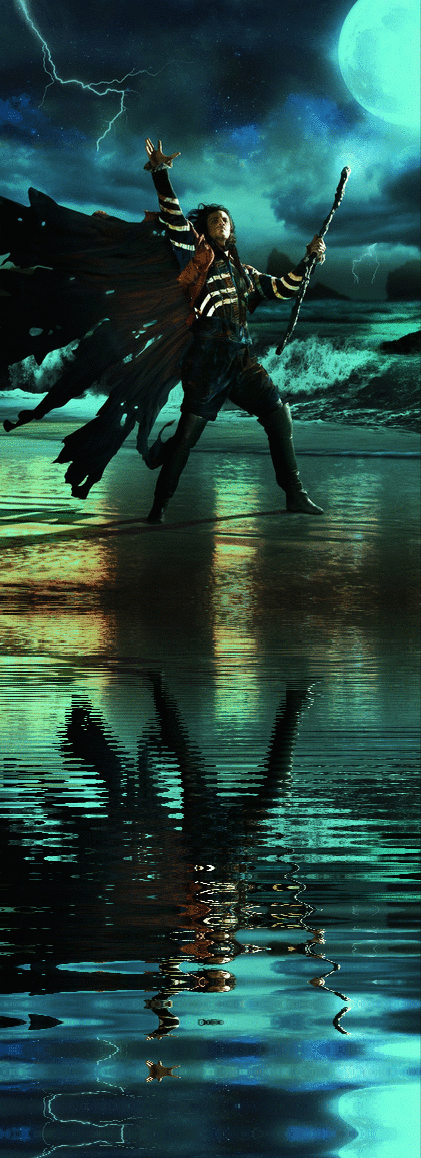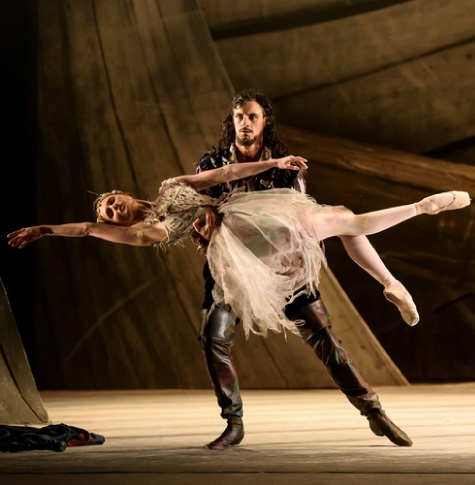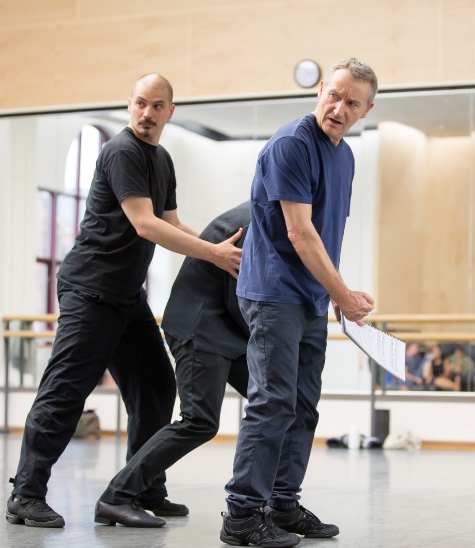|
 The
Tempest The
Tempest
Music by Sally Beamish
Birmingham Royal Ballet
*****
Ballet review
THE
history of recent British music is littered
with ballets that have fallen by the wayside. Where are Constant
Lambert’s Romeo and
Juliet, Alan
Rawsthorne’s Madame
Chrysanthème, Arthur
Bliss’s Adam Zero
and
Miracle in the Gorbals,
Peter Maxwell Davies’
Salome or William
Walton’s The Quest?
Britten’s
Prince of the Pagodas
has begun to receive revivals. And so, one might hope, will the late
composer John McCabe’s two-part Arthur,
and brilliantly devised, graphic
Edward II,
both staged since the millennium by David Bintley’s Birmingham Royal
Ballet, the last now impressively recorded by Hyperion Records.
There are almost 50
sets of incidental music to Shakespeare’s
Tempest,
spanning the 17th
to the 20th
centuries, and including Sibelius, Honegger, Humperdinck, albeit most
now largely if not forgotten, at least ignored.
Iain Mackay as Prospero
A few composers have
gone so far as to base whole operas on Shakespeare’s last play: the
Czech Zdeňek
Fibich (Prague, 1893-4) is one of the more notable, but pride of place
has now been usurped by Thomas Adès’ stagework for Covent Garden, which
is still making its way round the opera houses of Europe and has
achieved deserved success wherever it tours.
Even though perhaps
half a dozen ballets on the subject have been devised in the past half
century, a contemporary ballet treatment is just what was called for,
and David Bintley’s dance staging of
The Tempest is a joy from start to
finish – even at the curtain calls, the energy and invention of the
piece’s endlessly inventive choreography does not flag for a moment. As
a brilliant danced tribute to the Shakespeare quatercentenary, this
sensational, blossoming, richly rewarding brand new
Tempest
surely makes a handsome contribution.
It calls for a nearly two-hour score, and what it
badly needs to guarantee success is a composer with the experience, the
flair, the originality and variety and rich inventiveness to sustain
such a prolonged series of impish, magical or near-magical happenings.
Sally Beamish is one of the most acclaimed,
inspired and respected of the middle generation of British composers
working today. And the score she has produced meshes perfectly with the
type of dance at which Bintley so excels – or vice-versa. This is a
score utterly devoid of cliché but full of zest and vitality, while
beautifully attuned to the love scenes so essential to the denouement of
the plot, while conjuring up the magic and the mischief-making.
This exquisite originality of a scrumptious score
that bravely eschews the obvious hits you from the very outset. We are
geared up for a massive storm sequence as Alonso, the flawed King of
Naples, and his acolytes battle for their lives, but instead at the
outset we are treated to an almost deceptive calm, virtually an
evocative overture, which evokes the (so far) safe passage of the doomed
vessel. The use of especially flute here is all but benign: we get a
slight hint of Ariel descending to wreak havoc, but actually this plain
sailing offers something of an idyll in its own right.
There is even a splendid, carefree dance on deck,
with shades of renaissance or medieval music evoked by increasingly
swirling woodwind. And when the clouds do burst open, the syncopated
violence has the feel of, say, Kurt Weill – plenty of vivid paired
brass, but in no way overdone, even understated, thanks to conductor
Philip Ellis whose restraint makes the fated voyage almost becalmed
before it starts.
Often enough this score refuses to state the
obvious: Caliban’s famous speech, for instance, is treated not in some
mysterious, elusive way, but to some relatively straigh tforward
use of strings and woodwind; the mystery is there throughout the ballet,
but the sense of the miraculous, the pure and the intimate is reserved
especially for Miranda and Ferdinand; while the comic touches for
Stephano (the versatile Valentin Olovyannikov) and Trinculo (the
impossibly hilarious James Barton), once they are discovered, create a
splendid contrast: the gauche as opposed to the sublime. tforward
use of strings and woodwind; the mystery is there throughout the ballet,
but the sense of the miraculous, the pure and the intimate is reserved
especially for Miranda and Ferdinand; while the comic touches for
Stephano (the versatile Valentin Olovyannikov) and Trinculo (the
impossibly hilarious James Barton), once they are discovered, create a
splendid contrast: the gauche as opposed to the sublime.
Prospero with Jenna Roberts as daughter Miranda.
Picture Bill Cooper.
The orchestra Beamish deploys is used in an
admirably restrained, enchanting way; thus woodwind, brass and to some
extent strings (highlights include some bewitching violin solos from
leader Robert Gibbs) each have their own moments, with flute and
clarinet but also oboe given moments of beautiful definition; and the
brass divided so that horn, trumpet and (I assume) trombone and tuba are
given well-defined roles which enable them, time and again, to introduce
by no means banal, but subtle characteristics to individuals, or to the
group dances.
After the storm, the die-down to Miranda’s first
appearance – solo violin and reflective woodwind – is magical; Momoko
Hirata conjures up a wonderfully sensitive, innocent Miranda, and her
pure dance moves and refined white costume win one’s sympathy throughout
all her appearances in this exquisitely harnessed ballet.
Harp and strings are brought in for Prospero’s
first dance – the long speech of Act I scene ii of Shakespeare, here
trimmed to a manageable length solo. The relationship of father (Yasuo
Atsuji captures the nobility and paternal tenderness to perfection) and
daughter introduces the magical sound of the celesta, initially over
bassoon and low strings, and then (for Miranda alone) heralded by solo
flute and tympani.
There is a delicious sprightly dance for Ariel
(the alert and spirited Tzu-Chao Chou: the Japanese dancers in this
production all excelled at evoking the mystery and moral high ground of
the original play), fresh from wreaking havoc by sea but now becalmed,
and as the begrudging figure of Caliban emerges to threaten, low brass
is used in a splendid prodding way that underlines his evil intent.
Prospero comes to the rescue with yet more gloomy brass – his severity
suggested - and the tympani, an instrument that plays a major role in
the music, just occasionally perhaps overused, but mostly deftly
tingeing the textures like another chamber instrument, and to masterly
effect.
And so it goes on: paired cellos and woodwind
flourishes suggest a more benign, resigned, less indignant Caliban - yet
while Beamish’s music declines to present the strange creature as a
galumphing ‘monster’, Lachlan Monachan makes of him an all too human
failure, uncouth, gullible, vengeful.
The discovery of Prince Ferdinand, sensitively and elegantly danced at
every stage by César Morales, who has escaped the naval conflagration
but is now (by Prospero’s design) alone, yields exotic music for
xylophone (or bell), beautifully mysterious, interrupted by a dance of
Ariel’s spirits that works wondrously with clarinet and bass clarinet –
an instrument of which Beamish makes occasional atmosp heric
use. The music increases in intensity, but it is pizzicato violins and
soft tympani that set the young pair dancing. Beamish and Bintley here
unroll one of the work’s loveliest moments, with enquiring bassoon
opening up a gorgeous traditional pas-de-deux, as first love blossoms,
and as tripping strings suggest his tentative pursuit of Miranda, a
little waltz over solo cello is especially apt and entrancing. heric
use. The music increases in intensity, but it is pizzicato violins and
soft tympani that set the young pair dancing. Beamish and Bintley here
unroll one of the work’s loveliest moments, with enquiring bassoon
opening up a gorgeous traditional pas-de-deux, as first love blossoms,
and as tripping strings suggest his tentative pursuit of Miranda, a
little waltz over solo cello is especially apt and entrancing.
David Bintley (right) hands-on in Tempest rehearsals with
ballet master Dominic Antonucci, who takes on the role of baddy
Antonio. Picture Andrew Ross.
In another vivid effect, there is a dancing trees
interlude where solo piccolo and cello bewitch, each utterly enchanting,
and like several of the inanimate or semi-animate groupings for
ensemble, beautifully choreographed. We have had one brief, slightly
Brittenesque march (before Ferdinand); now the flawed Alonso instigates
a kind of pompous, Russian march, and this is all the more effective for
the unexpected whining in the strings and cluckings from wood block;
perhaps even a whisper of Stravinsky (the bass clarinet impinges ideally
for this).
Caliban is subjected to
some deep, sneering music, which yields to a cheerful use of brass and
timpani as he is lighted upon by Trinculo and Stephano (who has his own
witty brass solo). Solo violin over pizzicato cello is elaborated into a
sequence curiously reminiscent of Erich Korngold’s Violin Concerto: yet
each of these echoes - Prokofiev, Janáček,
Tippett, Stravinsky - is purely coincidental. Beamish’s music,
enterprising and exploratory, is entirely her own, and endlessly fresh
and original.
The music becomes enraptured near the end of Act
I: thus a full orchestral outburst – one of very few in the whole work –
subsides and makes way for the enchantment of solo clarinet and strings,
as the curtain falls on Ferdinand and Miranda once again united.
Where the composer uses oboe – especially
sparingly as a solo instrument – it is always telling, as at the start
of Act 2. Here we move to the mysterious banquet conjured up by Ariel
and his acolytes for Alonso’s bewildered party. Various pairings of
woodwind (flute soon joins oboe) create eerie effects for the meal, for
which a large table descends to edgy, uneasy music that duly terrifies
the captive participants. Doubly gripping is a string scherzo, suitably
electrifying, which accompanies Ariel’s sinister dance, clad now in
black.
By contrast, xylophone (or bells) and paired
flute and clarinet provide a perfect dance opportunity for the ‘good’
side. Antonio and Alonso’s previous overthrow of Prospero, rather like
that of Hamlet’s father, is played out with violent brass and some
effective solo strings, in an anticipation of the teasing Masques to
come. Prospero himself, in one of the most affecting solo passages in
the whole ballet, is nursed along by solo cello and the inevitable drum
– just possibly drumming effects are overused, potentially but never
quite becoming wearisome. Again th is
subsides, to enchanting violin solo and a small ensemble of lulling
strings. is
subsides, to enchanting violin solo and a small ensemble of lulling
strings.
A cheerful, attractively costumed peasant dance
fills the stage – with lightly prodding brass to help it along. This
heralds the arrival of Neptune (Mathias Dingman), a figure – like Aitor
Galende’s Pan later on - not featured in the original play but used
strikingly aptly here. Here Neptune is allocated piccolo and strings to
vivid effect, and a new lilting dance opens the door to the variously
scored, beautifully poised Masques of Ceres, Iris and Juno. Oboe leads
the way for Ceres (Samara Downs), while celesta leads on to the dance of
Iris (Brooke Ray), in which a magical suggestion of birdsong is evoked
by the kind of renaissance feel of the strings.
Mathias Dingman's Ariel as a Harpy at the black and
sinister party. Picture Bill Cooper.
The dance evolves into
more of an early 17th
century pirouette (one thinks of Peter Warlock’s adaptation of similar
material) as Miranda and Prospero join the country folk and peasant
girls. These full-blooded rural dances fade down – as Beamish is so
skilled at doing – to the expressive solo violin, used throughout to
such exquisite, touching effect, of Robert Gibbs. Stephano and his
party, meanwhile, are subjected to violent pursuit by fierce dogs,
splendidly depicted with snarling mouths, and the music suitably sneery
and yapping. But then Valentin Olovyannikov’s Stephano takes the stage
alone, in another memorable solo, unexpectedly serious rather than
merely comic: easily one of the ballet’s best items.
Light-stepped trumpet and strings provide a
platform for James Barton’s Trinculo, a brief solo which passes the
baton to the now chastened Antonio (the suitably sombre, though regal,
Chi Cao), Prospero’s formerly usurping brother, and Sebastian (Feargus
Campbell), the malignant brother of Alonso. Beamish builds the forces to
a large orchestral massing, before the dream lifts and some form of
normality is at last reencountered, with Prospero duly restored and the
return of the gorgeous sound of cello solo.
What makes the production round off so splendidly
is that the curtain calls are carried off with wonderful aplomb;
Bintley’s invention never droops: the vitality of these last appearances
balances admirably the desperate battle with the initial storm: in a
brilliant staging effect the ship is restored intact: the wheel has come
full circle, and the forces of good are restored.
Roderic Dunnett
10-16
BALLET
REVIEW
|

